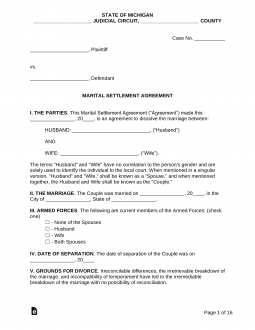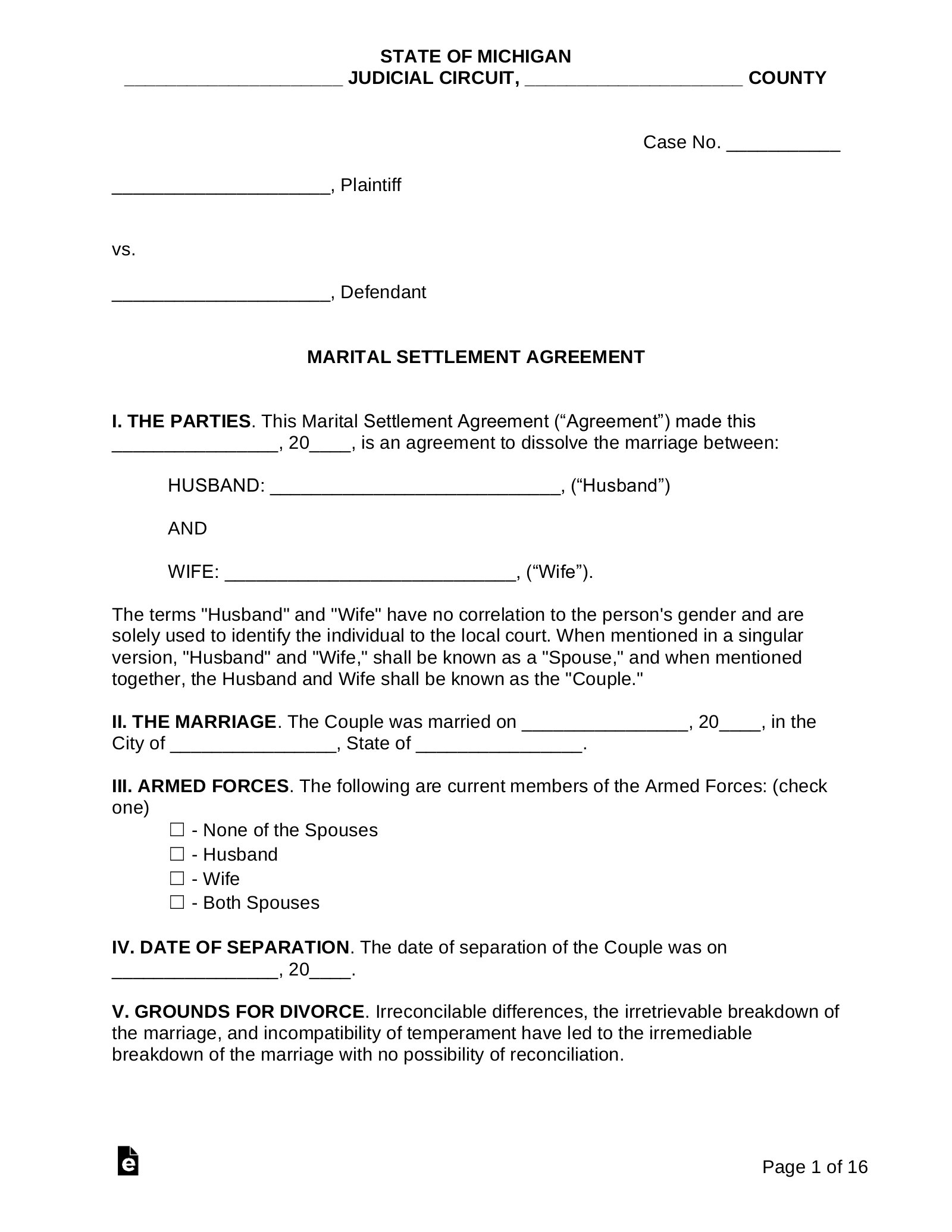Updated September 01, 2023
A Michigan marital settlement agreement is a contract that is used by married couples to set out the terms of their divorce. The agreement covers the division and ownership of property, assets, and debts, and it details child custody and visitation rights. If one party will be receiving alimony and/or child support from the other spouse, this should be included as well. Any terms not defined under contract will be determined by the court at the final hearing. By drafting an agreement, couples avoid having a third party decide the terms of their divorce and avert a more lengthy and costly legal process. The implications of such an agreement have large and long-lasting effects; therefore, it is recommended to obtain legal counsel when drafting the document to make an agreement that is as fair and agreeable as possible to both parties.
Table of Contents |
Divorce Laws
Statutes – M.C.L.A. Chapter 552 (Divorce)
Alimony (§ 552.13(1) and § 552.23) – The court may require either spouse to pay alimony to the other party as deemed necessary. The court is also permitted to award part of the real and personal estate of either spouse to the other party. In making their determination, the court will consider each party’s ability to pay, the character of each party, and all the other circumstances of the case.
Alimony Calculator – calculators.law
Child Support (§ 552.16 and § 552.605) – When determining the amount and payment schedule for child support in divorce cases, Michigan courts use the Child Support Formula that the Friend of the Court Bureau provides by legal mandate. Generally, the court will consider the following factors when setting child support:
- Each parent’s net and potential income
- Which parent has majority custody
- Medical and child care expenses
Child Support Calculator – micase.state.mi.us, miestimator.com
Division of Property (§ 552.401) – The court will divide the couple’s marital property in what they determined to be the most “equitable” way possible, which means fairly as opposed to equally. This decision will be made based on each party’s contribution to the acquisition, improvement, or accumulation of the property, as well as any other considerations the court finds to be relevant.
Grounds for Divorce (§ 552.6(1)) – In Michigan, spouses must allege that there has been an irreparable breakdown of the marriage relationship in order to establish sufficient grounds for divorce. Neither party is required to be found at fault under any circumstances; however, spousal misbehavior may be taken into consideration in the court’s judgment.
Interim Support (§ 552.13(1) and § 552.15) – While a divorce action is pending, either spouse may submit a motion to the court for temporary alimony or child support to be paid by the opposing party.
Residency (§ 552.9) – To file for divorce in the state, at least one (1) spouse must have lived in Michigan for one hundred eighty (180) days or more. Furthermore, one (1) party must have lived in the county where the action is filed for at least ten (10) days before filing unless their spouse was born in a foreign country, the couple has a child under eighteen (18) years of age, or the judge finds that their child could be at risk of being held in another country by the other spouse.
Divorce Forms
- Where to File – Circuit Court in County of Residence
- Filing Fee – $175
- How Long Does it Take? At least sixty (60) days
Uncontested Divorce Without Children:
- Divorce Complaint
- Verified Statement
- Summons (Additional Pages)
- Proof of Mailing
- Fee Waiver Request
- Answer
- Notice of Hearing
- Judgment of Divorce
- Record of Divorce or Annulment
Uncontested Divorce With Children:
- Divorce Complaint
- Verified Statement
- Uniform Child Support Order
- Summons
- Proof of Mailing
- Fee Waiver Request
- Answer
- Notice of Hearing
- Judgment of Divorce
- Record of Divorce or Annulment
How to File for Divorce in Michigan (8 steps)
- Complete Divorce Paperwork
- File Paperwork With Circuit Court
- Serve Defendant
- Defendant’s Answer
- Pre-Trial Proceeding and Marital Settlement Agreement
- Notice of Hearing
- Final Hearing and Judgment of Divorce
- Name Change
1. Complete Divorce Paperwork

To file for divorce, the couple must meet state residency requirements and the spouse filing the case (the “plaintiff”) will need to fill out the required paperwork. The plaintiff will need to fill out a Divorce Complaint (can be obtained from the court), Summons, and if the couple has children, a Verified Statement. The summons must be signed in front of a notary public, who will be required to provide their signed certification.
Alternatively, all of the necessary forms to start a divorce action can be completed, downloaded, and filled out with the interactive Do-It-Yourself Divorce Tool provided by Michigan Legal Help (notarization is not included with the online service).
2. File Paperwork With Circuit Court
The plaintiff will need to file all of their completed divorce papers in the circuit court for the county in which they reside. The court will charge a base filing fee of $175 to file a complaint; however, the spouse should contact the clerk of the circuit court in advance to verify whether their local court charges additional fees or requires further paperwork. Court fees can be waived if the plaintiff files a Fee Waiver Request form and their request is approved.
3. Serve Defendant

Once a divorce case has been filed, the other spouse (the “defendant”) must be served copies of the summons and complaint either by mail or in-person by a professional process server or sheriff.
If sent by mail, the plaintiff will need to send the paperwork by registered or certified mail with return receipt requested. Once they have mailed the documents, the plaintiff must complete a Proof of Mailing and file it with the court.
If delivered by a third party, the plaintiff will need to arrange for the defendant to be served by the sheriff’s office, police department, or professional process server (for a fee). When the defendant is served, they must fill out and sign the Acknowledgment of Service portion on a copy of the summons which they return to the server. Once the acknowledgment has been executed, the server will need to fill out, sign, and notarize the Proof of Service on the second page of the summons before filing it with the court or returning it to the plaintiff to be filed.
The plaintiff must serve their spouse within ninety-one (91) days from the date that the complaint was filed or their case may be dismissed.
4. Defendant’s Answer
If the defendant wishes to file a response to their spouse’s complaint, they will need to complete and file an Answer with the court where the case is filed. To carry out an uncontested divorce, the defendant will either need to agree with all the terms of the complaint when filing their answer or not file an answer at all.
5. Pre-Trial Proceeding and Marital Settlement Agreement
During the waiting period from the time that the defendant is served to the date of the trial, the couple may be required to attend classes to help them reach an agreement regarding the terms of their separation. These mediations are usually presided over by individuals called “friends of the court” whose job it is to help resolve domestic disputes. If the couple is in agreement, they will need to enter into a Marital Settlement Agreement to formally record the terms of their divorce and file the document with the court. The judge may call a pre-trial proceeding to verify that the required classes were completed and to review the couple’s agreement.
6. Notice of Hearing
The clerk of the circuit court will send each party a Notice of Hearing to inform them of their final hearing date, which will be at least sixty (60) days (for couples without children) or one-hundred eighty (180) days (for couples with children) from the date that the defendant filed their answer.
7. Final Hearing and Judgment of Divorce

Both parties must arrive on-time for the final hearing, where the judge will review their case. If the couple is in agreement, the judge will grant the divorce by executing a Judgment of Divorce. The plaintiff will need to file the signed judgment with the clerk of the court, at which point the divorce becomes final. Both parties can obtain a Record of Divorce or Annulment to update their personal records.
8. Name Change
In Michigan, any woman involved in a divorce may include the changing of their last name as part of their divorce judgment (§ 552.391). To change their name after divorce, individuals will need to file a Petition to Change Name with their local circuit court.


